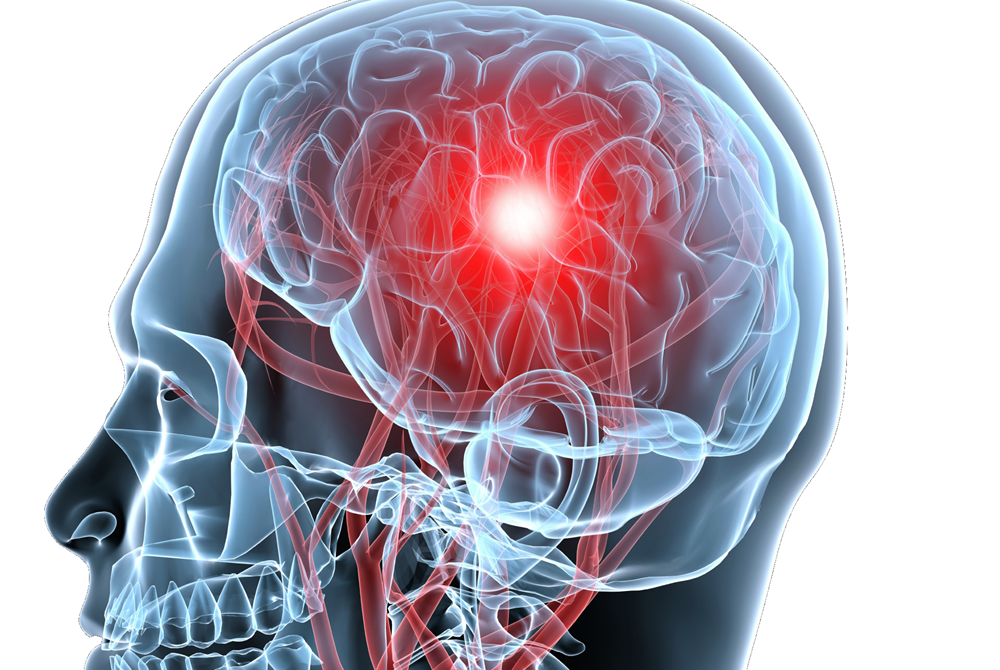
How To Be Proactive About Concussions In Student Athletes
December 5, 2023
Most people have seen the headlines about concussions as a common sports injury—and it's natural that parents of athletes may have concerns. A large misconception in sports is that previous concussions are to be blamed for ongoing headaches, blurred vision and memory loss, among other symptoms.
 “It’s really important to think about concussions in tandem with overall brain health,” says Jake Carpenter-Thompson, M.D., Ph.D., a board-certified neurologist at the Henry Ford Kutcher Clinic for Concussion and Sports Neurology. “Concussions can be concerning, but they shouldn’t be looked at in a vacuum. It is important to understand an athlete’s overall brain health to help manage recovery after any impact.”
“It’s really important to think about concussions in tandem with overall brain health,” says Jake Carpenter-Thompson, M.D., Ph.D., a board-certified neurologist at the Henry Ford Kutcher Clinic for Concussion and Sports Neurology. “Concussions can be concerning, but they shouldn’t be looked at in a vacuum. It is important to understand an athlete’s overall brain health to help manage recovery after any impact.”
One way to do that is to consult with your child’s doctor or a sports neurologist for an annual evaluation. A sports neurologist focuses on managing sports-related brain and nervous system injuries and conditions in athletes, such as concussions, post-concussion syndrome, peripheral nerve injuries, migraines, epilepsy and more.
“Having an annual evaluation of your athlete’s brain health when they are at their baseline – and uninjured – can help diagnose and treat issues when they arise,” says Dr. Carpenter-Thompson.
A qualified healthcare professional can use the baseline evaluation results as an important comparison tool if an athlete develops a suspected concussion.
Best Practices For Keeping Athletes Safe
Dr. Carpenter-Thompson shares these tips to ensure you keep front of mind your child’s brain health and safety, not just their athletic performance:
- Get a brain health baseline test. This should include a personal and family neurological history, with a focus on current issues. It is important to note any neurological conditions that may influence concussion recovery, such as ADHD, depression, anxiety or migraine headaches.
- Encourage your children to listen to their body. There are risks to playing any sport. Encourage your child to listen to and be honest about how they’re feeling. It’s the best way to prevent and treat injuries.
- In the event of an injury, look for the signs. Within 24 hours after an injury, an athlete should be evaluated if they are experiencing: headaches, fatigue, dizziness and nausea, changes in sleep habits, trouble with memory, confusion, irritability and anxiety, or light sensitivity.
- Know that brain injuries don’t just occur with a blow to the head. They can also occur from falls, car accidents or even whiplash. If your child is experiencing any symptoms, consult your physician.
- Remember that brain health is more than just concussions. If your athlete is complaining of chronic headaches, migraines, dizziness, memory or mood issues, there may be an underlying issue.
“There is no magic number of concussions a brain can sustain. Each person is different,” says Dr. Carpenter-Thompson. “The severity of the impact and recovery time can vary greatly for numerous reasons. By getting a brain health assessment before the injury, we can provide more targeted care to improve an athlete's overall clinical course.”
To find a sports medicine doctor or athletic trainer at Henry Ford, visit henryford.com/athletes.

Why Spring Sports Injuries Are Common & How To Prevent Them
April 11, 2023
When spring is in the air, athletes of all ages head outdoors to play their favorite sports, including softball, baseball, tennis, lacrosse and track & field.
 Unfortunately, the change of season also ushers in injuries, says Joseph Medellin, M.D., a primary care sports medicine doctor at Henry Ford Medical Center-Jackson. A variety of factors can cause spring sports injuries, including:
Unfortunately, the change of season also ushers in injuries, says Joseph Medellin, M.D., a primary care sports medicine doctor at Henry Ford Medical Center-Jackson. A variety of factors can cause spring sports injuries, including:
► Too much or too little winter activity: With shorter days and colder temperatures, some athletes aren’t as active in winter. Even if you are going to the gym regularly, sport-specific muscles – like muscles in the chest and shoulder that help you throw a baseball – may weaken.
At the start of a new sports season, a sudden increase in the demand on these muscles can lead to injury. Taking steps to get ready for spring sports before the season starts can lower this risk. It’s also not uncommon for multi-sport athletes to have games and practices year-round with multiple practices in one day. Not allowing yourself enough downtime can lead to overuse injuries, including strains and sprains.
► Transitioning outdoors: Winter sports often take place on hard surfaces, like wood basketball courts, gyms and treadmills. These surfaces are flat, making it easier to maintain your footing. Spring sports involve soft running surfaces like grass and turf that are uneven. They can also be wet, muddy or icy due to spring weather. All these circumstances increase the risk of injury due to falls.
Cold weather can also be a factor. Early spring temperatures can still be quite cold. It takes longer for muscles to warm up, and they might not work as efficiently. This can be especially troublesome with sports like softball where there are lulls in activity between innings. Playing with cold muscles can increase the risk of sprains and strains.
► Sport-specific movements: Throwing, sprinting and kicking are moves that most people don’t do on a daily basis. They require powerful motions that can stress unconditioned muscles and joints. This is especially true if you haven’t been cross-training to strengthen supporting muscles or haven’t gradually increased your intensity.
A sprinter may experience hip pain from running at full speed around the curve of a track. Rotator cuff injuries can occur in sports that involve throwing, like the javelin, shot put, and baseball and softball. Soccer players can pull their groin from repeatedly taking long kicks.
If You Suspect A Sports Injury, Don’t Put Off Care
A doctor’s office is often the last place eager athletes want to be at the start of the season. But pain should not be a regular part of your training program. If you think you’ve sustained an injury, trying to push through often makes it worse.
Making time to see the doctor can be challenging, especially if you have to miss a practice or game for your appointment. But it’s worth it. “The sooner you get evaluated, the sooner we can get you on the path to recovery,” Dr. Medellin says.
The opposite can be said when treatments are delayed. “The longer you’ve had an injury, the longer it may take to heal,” explains Dr. Medellin. “And first-line treatments aren’t as likely to be successful, which can mean more time away from your sport.”
Sports Injury Treatments That Keep You In The Game
Seeing a doctor doesn’t always mean you’ll have to sit out the season. Treatment may include intermittent rest, as long as you don’t have a severe injury like a stress fracture or tendon tear. “We may recommend a return to sport at a lower intensity or with additional rest days to see if the pain goes away,” says Dr. Medellin.
Patients with minor injuries might also benefit from physical therapy between practices. Physical therapists can correct poor form. They can also help you safely stretch and strengthen injured muscles to promote healing. Conditioning through Henry Ford Health's sports performance program can also speed recovery and prevent injury.
“A sports medicine doctor’s goal is to keep athletes active and involved in the sport they love,” says Dr. Medellin. “That’s what I want for my patients.”
To find a sports medicine provider at Henry Ford Health, visit henryford.com/sportsmedicine or call 313-651-1969.
Joseph Medellin, M.D., is a primary care sports medicine doctor at Henry Ford Medical Center-Jackson.

